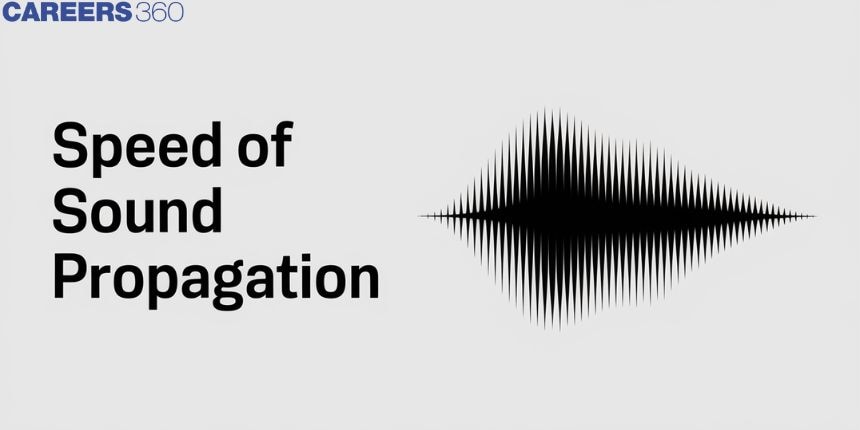Speed of Sound Propagation - Definition, Formula, Characteristics, FAQs
Every second, we are bombarded with a variety of sounds. It could come from the instruments, thunder, or a long number of other things. But what exactly is sound? What happens when it happens? How does the sound get made? What is the process of sound propagation? Let us give you answers to all of these questions. We supply students with sound propagation notes in order for them to fully comprehend the phenomenon and the physics behind it. They will also comprehend how sound travels through various mediums and the subsequent procedure.
This Story also Contains
- What is Sound?
- Formula of speed of sound-
- Characteristics of sound-
- What is the speed of sound?
- Speed of sound in different media-

What is Sound?
Sound, like heat, electricity, and other forms of energy, is nothing more than a type of energy. Consider the sound of a bell as an example of a sound source. A sound is produced whenever we strike a bell. The vibration that follows the sound causes the object's body to move back and forth.
Sound is a vibration that travels through solid, liquid, and gas mediums as an acoustic wave, with the medium contracting and expanding alternately.
Also read -
Formula of speed of sound-
The following is the formula for the speed with regard to gases:
$\nu=\sqrt{\frac{\gamma P}{\rho}}$
- The coefficient of adiabatic expansion is ?
- The coefficient of adiabatic expansion is ?
- The pressure of the gas is denoted by the letter P.
- ? is the density of the medium through which sound travels.
Characteristics of sound-
Sound is represented graphically as a series of continuous peaks and valleys. The wavelength of a wave is the distance spanned between two continuous peaks or troughs. The number of cycles covered per unit of time is the frequency of sound. Hertz is the unit of measurement.
Also Read:
- NCERT Solutions for Class 11 Physics Chapter 15 Waves
- NCERT Exemplar Class 11 Physics Solutions Chapter 15 Waves
- NCERT notes Class 11 Physics Chapter 15 Waves
What is the speed of sound?
The dynamic propagation of sound waves determines the speed of sound in air. This is determined by the properties of the medium in which the propagation occurs. In an elastic medium, the term "velocity of sound in the air" is used to describe the speed of sound in airwaves.
FACTORS AFFECTING SPEED OF SOUNDS-
The following are the primary factors that influence the sound's speed:
- The Density of the Medium: Sound travels through a medium. The density of the medium is one of the parameters that influence sound speed. The faster sound goes through the medium, the higher the density. The smaller the density, on the other side, the slower the sound propagation speed. This means that the velocity of sound changes directly with the density of the medium in different media.
- The Medium's Temperature: The higher the temperature, the faster the sound travels through the medium.
Related Topics,
Speed of sound in different media-
1. Speed of sound in solid-
Sound travels through solids by colliding with different molecules and particles. Solids have a higher density than other media, resulting in a fast sound speed. The speed of sound in solids is around 6000m/s.
2. Speed of sound in liquid-
Liquids have a lower density than solids and a higher density than gases. As a result, the speed of sound in liquids lies somewhere between that of solids and gases.
3. Speed of sound in gases-
In gases, the speed of sound is independent of the medium. This is due to the consistency of gas density, regardless of its kind.
4. Speed of sound in vacuum-
Because sound does not travel in a vacuum, its speed is zero. In a vacuum, there are no particles, therefore this happens. Sound waves do not travel through space in a vacuum.
5. Speed of sound in water-
Sound travels faster in water than it does in air. Or, to put it another way, sound travels faster in water than it does in air. In water, sound travels at a speed of 1480 meters per second. It's also worth noting that the speed of distilled water varies between 1450 and 1498 meters per second, whereas the speed of saltwater varies between 1450 to 1570 meters per second.
Also, check-
- NCERT Exemplar Class 11th Physics Solutions
- NCERT Exemplar Class 12th Physics Solutions
- NCERT Exemplar Solutions for All Subjects
NCERT Physics Notes:
Frequently Asked Questions (FAQs)
Pitch is the property that allows you to tell the difference between a sharp and a dull sound. The pitch of a sound wave is determined by its frequency. The pitch rises in proportion to the frequency.
The quantity of energy travelling through the unit area at that location is defined as the intensity of sound. The square of the distance between the point and the source causes it to be inversely proportional. It's also proportional to the square of the vibration and frequency, as well as the medium's density.
Bel, decibel and phon are the three different units of loudness.
Steel.
The density and elasticity of a gas influence the speed of air sound in it.
The speed varies based on atmospheric conditions, with the temperature being the most critical element. Air pressure has no effect on the speed of sound, and neither does the humidity. In a perfect gas approximation, air pressure has no influence.
Heat causes air molecules to travel more quickly, making them better suited to carrying a pressure wave than slower-moving molecules. As a result, heat causes the sound to travel faster.